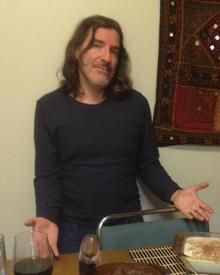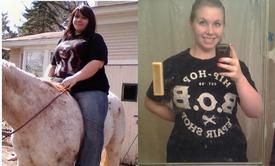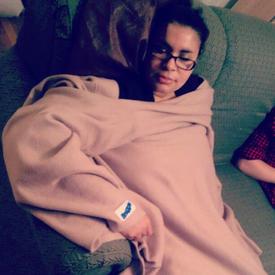8 cups a day?

sshap21712
Posts: 139 Member
Why drink 8 cups of water a day? Isn't food already mostly water?
0
Replies
-
Actually 8 cups is the minimum! You should really drink half of your body weight (in oz of water). It really makes a difference!! Good luck in your journey!0
-
There are so many reasons to drink water!
First, it's a zero calorie natural beverage that keeps you hydrated. Keeping yourself hydrated is incredibly important, as we all know. Plus, if you don't drink enough water, you can feel sluggish and tired. Additionally, if you drink a glass of water before a meal, some studies have shown that it curbs your appetite, thus cutting calories.
The list goes on and on! Those are just a couple examples.0 -
Food is the gasoline
Water is the oil0 -
Because your body needs water for pretty much everything it does (we're 70% water...) and it shouldn't have to work to filter water out of food just to get what it needs. If you don't drink water your body will retain water (and the extra pounds that come with it) because it think it won't get what it needs.
There is, in all honesty, no reason not to drink water. So just drink it.0 -
Actually, the OP is right about some foods containing water. Melons...a notorious fruit for being mostly water.
Not everyone needs 8 glasses of H20. I would suggest talking to your doctor and a dietician. Not everyone is the same. Some people retain water for various reasons. Drinking 8 cups could end up being detrimental to your health.
Pay attention to signs and symptoms of too much water. You can google water intoxification and lots will come up. Best to talk to a doc to find out what's recommended for you.
Don't believe me? My father was restricted years ago with his intake of liquids. My mother-in-law is now going through it. She was also told that milk that she puts on her oatmeal, counts towards her liquid intake. Not everyone needs to do this. But, unless you know what you're talking about, not everyone needs 8 glasses or more. The recommendation is actually 6-8 glasses.0 -
Actually, the OP is right about some foods containing water. Melons...a notorious fruit for being mostly water.
Not everyone needs 8 glasses of H20. I would suggest talking to your doctor and a dietician. Not everyone is the same. Some people retain water for various reasons. Drinking 8 cups could end up being detrimental to your health.
Pay attention to signs and symptoms of too much water. You can google water intoxification and lots will come up. Best to talk to a doc to find out what's recommended for you.
Don't believe me? My father was restricted years ago with his intake of liquids. My mother-in-law is now going through it. She was also told that milk that she puts on her oatmeal, counts towards her liquid intake. Not everyone needs to do this. But, unless you know what you're talking about, not everyone needs 8 glasses or more. The recommendation is actually 6-8 glasses.
Normal, healthy people, especially ones who exercise, need at least 8 glasses of water per day, if not more to compensate for what they lose through sweat. Water intoxication from 64oz of water plus food is not common in healthy people. For the majority of people it takes over 150oz of water every day for an extended period of time for hyperhydrosis to occur.0 -
Hmmmm.....so 64oz is exactly half my body weight....do you think it would be bad if I drank more than that?0
-
Hmmmm.....so 64oz is exactly half my body weight....do you think it would be bad if I drank more than that?
It depends on how much water comes from your food and other beverages, where you live, how much you sweat in a day, etc. If you feel thirsty enough to drink a little more, you should be fine.
Here's a link to hand quiz that can help you figure out how much water you need. But, if you have any question about how much water is safe for you, ask your doctor.
http://nutrition.about.com/library/blwatercalculator.htm0 -
Ooops....I'm a dummy. 64oz is more than half my body weight (108lbs)........half my body weight would be 54oz...would it be safe to say that that is enough for me to drink per day?0
-
Actually 8 cups is the minimum! You should really drink half of your body weight (in oz of water). It really makes a difference!! Good luck in your journey!
So you're telling me I'm supposed to drink about 140 lbs of water a day?
I would die. lol0 -
Why drink 8 cups of water a day? Isn't food already mostly water?
I hope that everyone will please check for legitimate CURRENT scientific research before perpetuating the myth that every adult needs to drink the 8 glasses of water a day. This information has not been borne out by recent studies, and in fact, if you are not thirsty, are eating and drinking normally and your urine is clear, your hydration is adequate. The bottled water industry has been busily at work convincing Americans to run around clutching water bottles, when in fact, there is no reason to be "forcing" water intake. Elderly people are a different story, but not healthy adults.0 -
Why drink 8 cups of water a day? Isn't food already mostly water?
I hope that everyone will please check for legitimate CURRENT scientific research before perpetuating the myth that every adult needs to drink the 8 glasses of water a day. This information has not been borne out by recent studies, and in fact, if you are not thirsty, are eating and drinking normally and your urine is clear, your hydration is adequate. The bottled water industry has been busily at work convincing Americans to run around clutching water bottles, when in fact, there is no reason to be "forcing" water intake. Elderly people are a different story, but not healthy adults.
^ That. I personally know someone who was put in the hospital twice because they drank too much water. No joke. She was elderly and in poor health anyway, but the point remains valid. Do your research.0 -
Actually 8 cups is the minimum! You should really drink half of your body weight (in oz of water). It really makes a difference!! Good luck in your journey!
So you're telling me I'm supposed to drink about 140 lbs of water a day?
I would die. lol
If you weigh 280lbs half your body weight would be 140lbs. Instead of pounds you would drink ounces, so you'd drink 140 ounces of water per day. It's not really that hard, but it also seems like it's a little much. Most days I drink between 100 and 120 ounces of water (well over half my body weight). I'm not running to the bathroom every 10 seconds (or even every 10 minutes), my urine isn't clear, I'm not at all over hydrated. Most of us supplement our water intake with other drinks, which is fine, but I don't. I only drink water, I live in a high altitude desert, I'm pregnant and I generally exercise for 60 minutes 5 days a week. It took me a while to adjust to drinking enough water but now that I do, my body craves it. If I go to long without drinking water or just don't drink enough throughout the day I definitely notice it.0 -
Drink what feels good to you. I could easily drink 150 ounces a day of ice cold water, I love it0
-
Also, as far as food is concerned, it totally depends on what you're eating. Grains are not mostly water. Meat is not mostly water once it's been cooked. Fresh fruits and vegetables often have a high water content, but again, it depends on which ones. Don't rely on foods to supply your body with the water it needs. For most normal, healthy people without any underlying medical problems, drinking 64oz of water, or more, won't do any harm. I think at least half of the people on MFP are proof of that, if not more!0
-
Hyperhydrosis (too much water) is rare.....dehydration is common. Drinking 6-8 8oz glasses is sound advice. Living in hot, dry areas, extra exercise increases your needs. Foods such as melons, do have a lot of fluid in them but not enough to substitute even one glass of water.
If there is ANY chance of kidney disease you should already be involved with a physician and be following his/her advice.0 -
There are many third tier, peer reviewed articles about water intake, but the following is a great synopsis of the highlights and is eminently readable:
Quote:
How Much is Too Much?
Unfortunately, trying to review the scientific literature available to support the 8 x 8 per day recommendation is not possible. According to Heinz Valtin, M.D., professor emeritus at Dartmouth Medical School, there is no past or present scientific evidence supporting the consumption of drinking at least eight glasses of water per day for the average, healthy adult.4 Valtin recently released his results in the American Journal of Physiology after an exhaustive and detailed search he made in an attempt to find evidence supporting this highly prevalent recommendation. He reports that after performing a comprehensive review of multiple electronic databases, interviewing several nutritionalists specializing in the field of thirst, and dialoguing with many water balance specialists, he has been unable to produce any evidence in support of consuming at least eight glasses of water per day. In fact, he reports that the majority of available literature reviewed says drinking at least eight glasses of fluid per day for the average, healthy, sedentary-
to-mildly-active adult is not necessary.
The Strength and Conditioning Journal supports Valtin's claims by reporting that kidney physiologists at the National Institutes of Health believe an average-sized, sedentary adult in a temperate climate requires about four, 8-ounce servings of fluid a day to replace fluid losses.5 This amount is roughly what is obtained through daily food intake. Says the article's author, "In short, though doctors do not recommend it, many of us could cover our bare-minimum daily water needs without drinking anything during the day."
A Myth is Born
But how is it that something considered such common knowledge and prescribed by so many could largely be a falsehood? Although the true roots for the derivation of this statement are unknown, Valtin says a likely origin of this advice appears to have been born from a misinterpreted report published by the Food and Nutrition Board of the National Research Council. In 1945, the Food and Nutrition Board reported that a suitable fluid intake of water for adults was 2.5 liters per day (84.5 fluid ounces) or 1 milliliter of water for each calorie of food consumed. The original publication also reported that most of this quantity of fluid is contained, and can be obtained, within the foods we consume. Unfortunately, it would appear this latter piece of information seems to have been lost in the publication's translation, leaving us with this advocacy to consume eight glasses of water per day, in addition to the fluid we've derived from foods.
It should be noted that in addition to the eight glass
recommendation, proponents of this advice usually footnote the statement by saying fluids containing alcohol or caffeine do not count toward the total daily amount of water consumed, regardless of their water content. This, they argue, is because caffeine and alcohol promote fluid loss through a diuretic effect on the body. But does it seem rational that consuming an 8-ounce beverage with mild caffeine or alcohol content could actually cause the body to lose fluid equal to, or more than, what that drink contains? If this were true, these types of fluids would cause an overall net loss of fluid in the body and dehydration.
After reviewing several reports released through the U.S. Department of Agriculture, the World Health Organization, and independent researchers, Valtin concluded that the recommendation to consume an additional glass of water when having an alcoholic or caffeinated beverage, simply does not "hold water." Likewise, the Strength and Conditioning Journal acknowledges that caffeine does cause a loss of water in the body, but it is a fraction of what was just added. A cup of coffee can add at least two-thirds the amount of fluid to the body that a regular cup of pure water would supply in a person accustomed to regular caffeine intake.6The Journal of the American College of Nutrition also reported the results of a small study that tested the effects of caffeinated beverages versus water on hydration status. The researchers of that study concluded that advising people to disregard caffeinated beverages as part of their total daily fluid intake was not substantiated by the results they found.7
The Institute of Medicine's Food and Nutrition Board recently offered this to the debate: "While consumption of beverages containing caffeine and alcohol has been shown in some studies to have diuretic effects, available information indicates that this may be transient in nature, and that such beverages can contribute to total water intake and thus can be used in meeting recommendations for dietary intake of total water.'8
A final part of this inaccurate water message says that by the time our thirst signal alerts us we are thirsty, we are already facing dehydration. Just as in the previous case, applying rational thought to this would cause one to question that after years of human evolution, how could our internal alarm system for recognizing dehydration fail us so miserably?
Valtin reports that scientific studies have found just the opposite effect is true, and thirst is an early sign of dehydration.9 By measuring plasma osmolality (the concentration of solids in the blood), the extent of hydration can be determined. A change in plasma osmolality by less than 2 percent would elicit the thirst response. Furthermore, it would take a change in the body's plasma osmolality by 5 percent to actually be considered dehydrated. This would mean that our internal alarm against dehydration works just as well as one would hope.
END QUOTE0 -
i usually aim for about 8 cups a day, but if i don't drink that much, i just hang on to it. some days i drink more, some days less. i generally listen to my body.0
-
Thanks for the info torregro, it was very interesting.
I drink a lot of water personally. Living in a relatively dry high altitude city makes it easy to become dehydrated. I drink while I exercise because I feel thirsty. I carry a bottle of water around pretty often for the same reason. Water helps keep your skin hydrated as well, and I find my weight loss is better if I stay well hydrated.0 -
Not necessarily, drinking water flushes your body from the toxins and "bad things" you get from food, 8 oz of water is far too low honestly, you should be drinking your body weight in oz's per day. I weigh 165 so I aim for about 20 cups0
-
I am one of those oddball people. My urine is completely clear after about 5-6 cups of water.0
-
Personally, I drink a TON of water. Especially after cutting out soda and most other beverages. It's not uncommon for me to drink 10-12 glasses a day, especially now since I'm exercising most days.
TIP: If you're struggling with getting enough water, try buying a Brita filtered pitcher. Seriously, I wasn't drinking enough water before I got the pitcher, and now it makes drinking water so much easier. The water tastes pure and crisp, and it's always cold!! Definitely more enticing than warm tap water in my opinion.0 -
It's strange. I had a Brita pitcher, and when I'd drink the water from it my tonsils and adenoids would start hurting, like when you're getting sick. I stopped and that stopped.0
-
It's strange. I had a Brita pitcher, and when I'd drink the water from it my tonsils and adenoids would start hurting, like when you're getting sick. I stopped and that stopped.
Wow that is strange!! I know with my pitcher I'll sometimes get those little pieces of carbon in the water, but I don't know if that is bad for you or not.0 -
We just thought it might have been something in the pitcher that I was sensitive to, now we just buy the bottled water for drinking and recycle the bottles. Not the most "earth friendly" but I'll take that over the strange reaction or not drinking water any day. Our tap water is disgusting due to old pipes.0
-
Thanks Torrego, that was an interesting read.
I think that if anyone is wondering about being dehydrated that looking at the colour of your urine (just a quick glance after you go!) is a good guide - if it is dark yellow you are possibly dehydrated, very light or clear you aren't dyhydrated. Anywhere inbetween is probably going to be OK, but be guided by how you feel (or by medical advice if you think something isn't right).0 -
Thanks Torrego, that was an interesting read.
I think that if anyone is wondering about being dehydrated that looking at the colour of your urine (just a quick glance after you go!) is a good guide - if it is dark yellow you are possibly dehydrated, very light or clear you aren't dyhydrated. Anywhere inbetween is probably going to be OK, but be guided by how you feel (or by medical advice if you think something isn't right).
I've heard that before but my urine is often very yellow and I drink like 10 glasses of water a day! So i'm a little confused on that one...0 -
Well maybe the urine colour doesn't work for everyone - I should have added that some multivitamins can turn it fluorescent yellow!0
-
Food is the gasoline
Water is the oil
I love that!
Water is good! mmmm0 -
Actually, water consumption is more important than food consumption ... The human body will die of deydration before hunger.
Depending on the air temepratures, without any water, death through dehydration will occur after 2 and up to 10 days, whereas if you just had water and no food, the body will last considerably longer - sometimes weeks - depending on your body fat.0
This discussion has been closed.
Categories
- All Categories
- 1.4M Health, Wellness and Goals
- 398.2K Introduce Yourself
- 44.7K Getting Started
- 261K Health and Weight Loss
- 176.4K Food and Nutrition
- 47.7K Recipes
- 233K Fitness and Exercise
- 462 Sleep, Mindfulness and Overall Wellness
- 6.5K Goal: Maintaining Weight
- 8.7K Goal: Gaining Weight and Body Building
- 153.5K Motivation and Support
- 8.4K Challenges
- 1.4K Debate Club
- 96.5K Chit-Chat
- 2.6K Fun and Games
- 4.8K MyFitnessPal Information
- 12 News and Announcements
- 21 MyFitnessPal Academy
- 1.6K Feature Suggestions and Ideas
- 3.2K MyFitnessPal Tech Support Questions


















